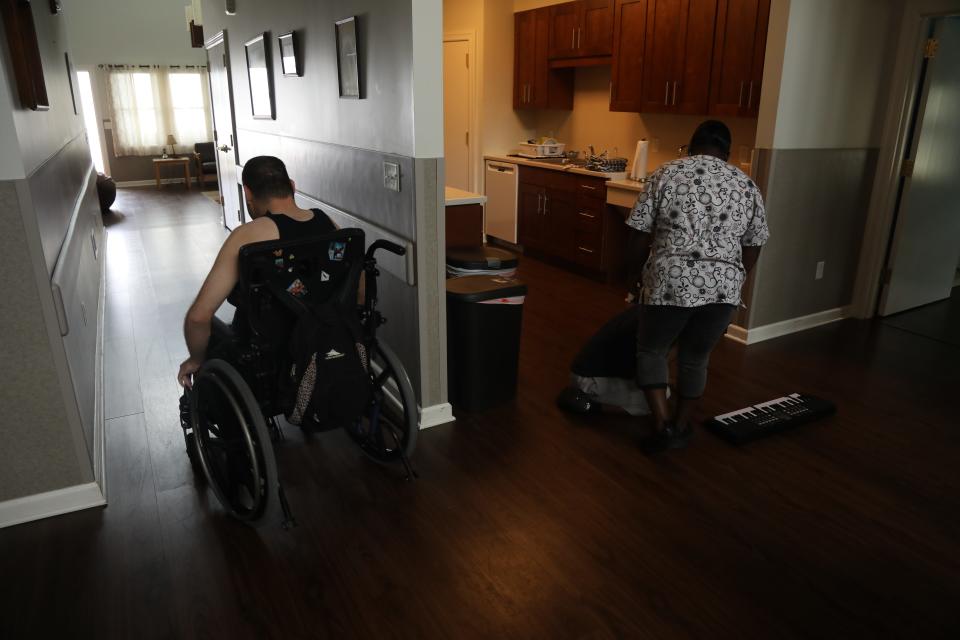NJ group homes have a staffing crisis. Can cameras and 'remote care' fill the gaps?
Staff shortages continue to plague the companies charged with caring for some of New Jersey’s most medically fragile residents.
Known as direct support professionals, the aides employed by those companies help make daily life possible for roughly 10,000 people with disabilities living in New Jersey's 2,200 group homes. Yet in a tight labor market, one in five DSP positions go unfilled and turnover is rampant, according to industry surveys.
Group home operators hope technology can ease the strain.
The Alliance for the Betterment of Citizens with Disabilities, a trade group representing 64 providers, has requested permission from New Jersey regulators to install a suite of smart technologies, including motion sensors, speakers, tablets and cameras, in combination with offsite monitoring to fill in the labor gaps at facilities around the state.

The devices are already in use in some homes, but the industry's "remote care" proposal would broadly scale up their implementation, having them replace hard-to-find human staff. Seventeen states have already approved similar pilot programs, according to the alliance, but New Jersey has yet to join them.
“It’s a bit of a sea change,” said ABCD Director Catherine Chin. “People will have to get used to it.”
The use of cameras and off-site monitors raises questions about privacy, safety and response times. Nonetheless, advocates for people with disabilities say they see a role for more technology, not only to help fill severe post-COVID staff shortages but also to grant some residents additional privacy and autonomy.
"Depending on the needs of the person, there is someone there who can get there in a couple of minutes or there would be someone who is a couple of miles away," said Mercedes Witowsky, executive director of the New Jersey Council on Developmental Disabilities. "It should be arranged based on the needs of the individual."
In Pennsylvania, group-home operator Community Options Inc. said it has seen positive results in five locations where it has installed cameras and other devices. Company staff members monitor the homes from afar, though some providers may contract with outside services to watch over the feeds.
"We had a couple of individuals where we were able to remove an overnight staff," said Svetlana Repic-Qira, an executive vice president at the Princeton-based company. "We have sensors on the doors to notify us when the door opens. We would be notified if a heat sensor went on, or if the stove went on."
Notified by smartphone
Alerts or requests for help are handled by Community Options employees, who are notified on their smartphones.
"It might be a manager or a staff member at another home responding. It's a chain that could go as high as a director, so you don't have just one person," Repic-Qira said, adding that so far they "haven't had any major issues."
Noted: Captioning isn't just for those with hearing loss anymore: Why Gen Z loves subtitles
For subscribers: NJ’s plan to expand special education hasn’t gone as hoped. Why so many were shut out
Technology isn't a good substitute in cases where residents with more severe disabilities need extended support, she said. But Community Options believes remote care may make sense for about one in 10 residents. Gear such as voice-activated lights would be useful to all residents, including people with impaired mobility, Repic-Qira said.
The company operates 656 homes in 11 states, including 152 in New Jersey.
Disability advocates and home providers said plans would be assessed and implemented on a case-by-case basis. The technology would allow companies to look out for those in their charge while also giving residents a chance to have some alone time in their homes. It might also give providers the ability to allocate staff "more appropriately," Witowsky said.
"The question now is: How can we consider this option for somebody who needs support but not somebody who is with them 24/7?" she added.
"It's a national movement. New Jersey has done some things. It will fund some assistive technology. But we are not doing all that we can," she said. "We need to establish a funding structure where the state will pay for that in lieu of a DSP."
New Jersey officials have been receptive to the plans, said Chin, of the industry alliance. She hopes to receive a decision from regulators this year.
Department of Human Services spokesperson Tom Hester said the agency is reviewing "how it can include such technology" to "empower individuals with intellectual and developmental disabilities to live more independently."
Joseph Macbeth, CEO of the National Alliance for Direct Support Professionals, said such tools are a key part of the solution to the staffing crisis and can also provide a respite for DSPs, who typically work grueling hours.
"At the highest levels of every state government and in the Biden administration, the caregiving infrastructure is being given serious discussion, and that's good," Macbeth said.
Gene Myers covers disability and mental health for NorthJersey.com and the USA TODAY Network. For unlimited access to the most important news from your local community, please subscribe or activate your digital account today.
Email: myers@northjersey.com
Twitter: @myersgene
This article originally appeared on NorthJersey.com: NJ group homes for disability want smart homes to replace some aides

